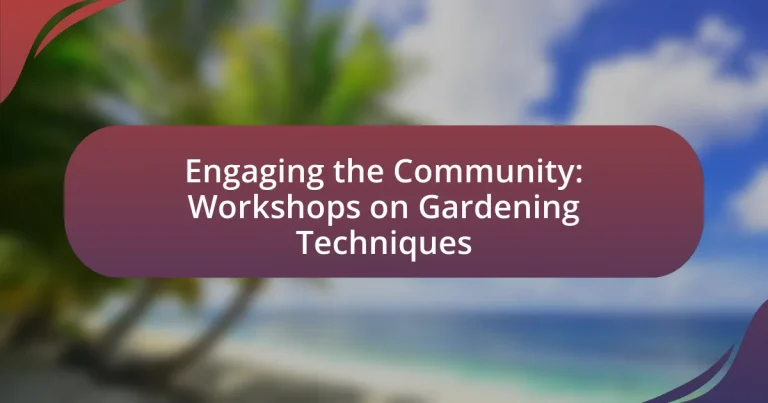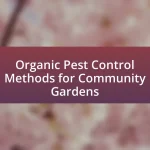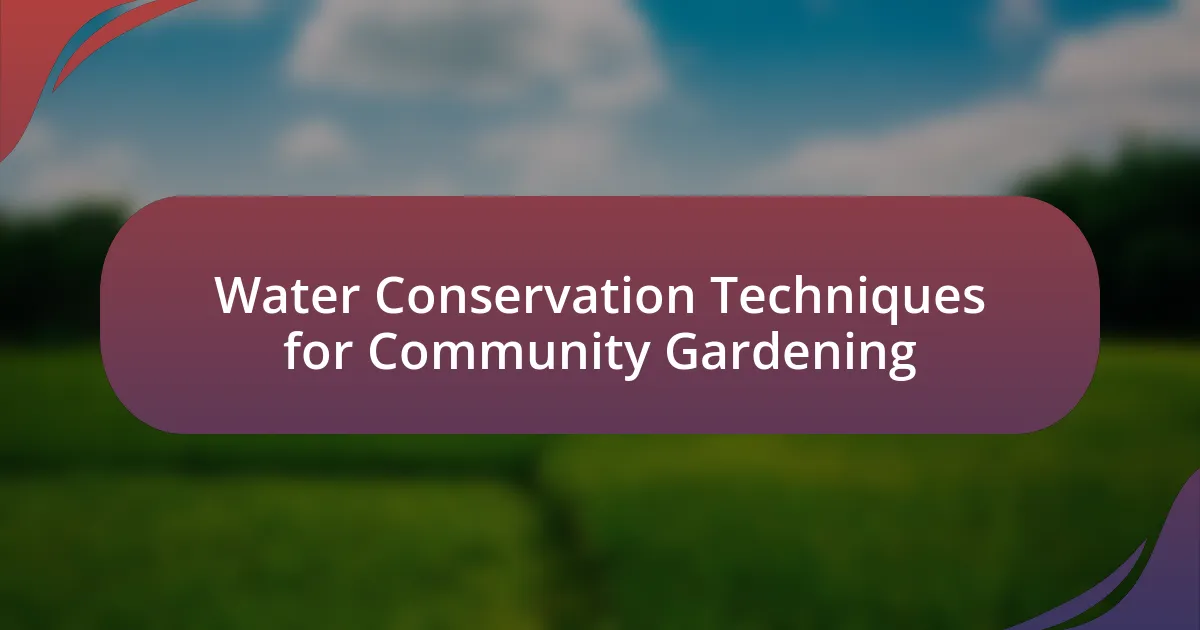Community Workshops on Gardening Techniques are organized events designed to educate individuals on various gardening practices, including planting, soil management, pest control, and sustainable methods. These workshops aim to enhance community engagement through hands-on experiences, fostering collaboration and social interaction among participants. They attract a diverse audience, from beginners to experienced gardeners, and focus on promoting sustainable practices that improve local food security and environmental awareness. By providing practical skills and resources, these workshops contribute to community cohesion, personal well-being, and the beautification of local spaces.
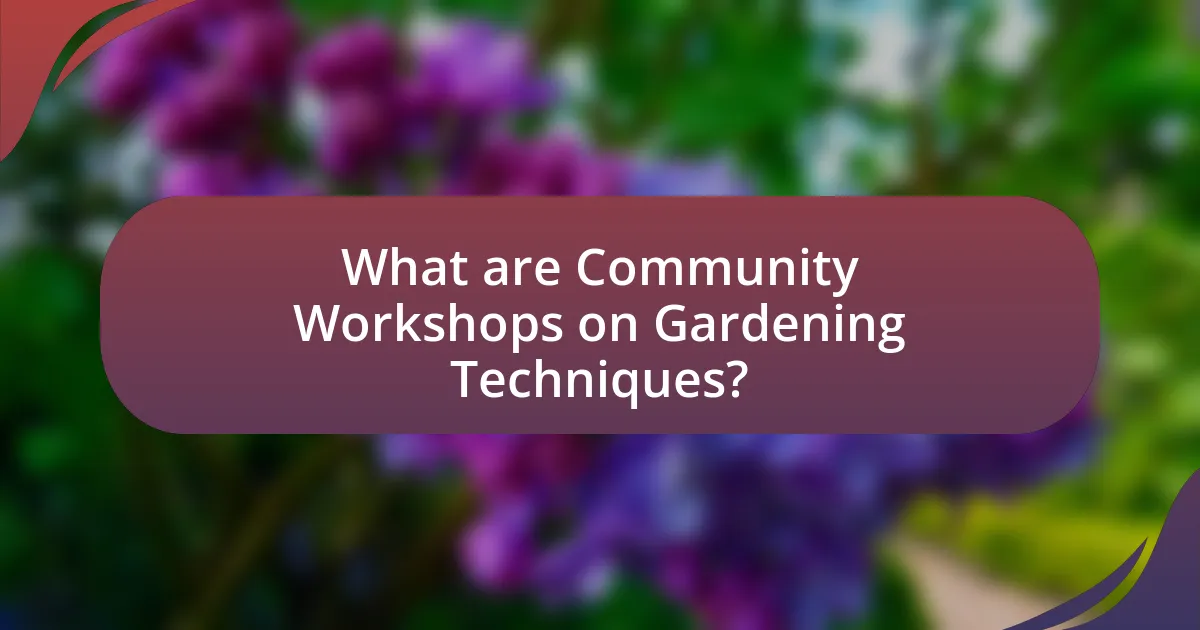
What are Community Workshops on Gardening Techniques?
Community Workshops on Gardening Techniques are organized events where individuals gather to learn and share knowledge about various gardening practices. These workshops typically cover topics such as planting, soil management, pest control, and sustainable gardening methods. They aim to enhance community engagement by providing hands-on experiences and fostering collaboration among participants. Research indicates that community gardening initiatives can improve local food security and promote environmental awareness, highlighting the importance of such workshops in building resilient communities.
How do these workshops engage the community?
These workshops engage the community by providing hands-on gardening education that fosters collaboration and skill development among participants. Community members actively participate in planting, maintaining, and harvesting crops, which enhances social interaction and strengthens local networks. Research indicates that community gardening initiatives can improve social cohesion and increase access to fresh produce, thereby promoting healthier lifestyles.
What types of participants typically attend these workshops?
Participants who typically attend workshops on gardening techniques include community members interested in horticulture, local gardeners seeking to enhance their skills, and individuals looking to engage in sustainable practices. These workshops often attract a diverse audience, including beginners eager to learn the basics of gardening, experienced gardeners aiming to refine their techniques, and families wanting to cultivate gardening as a shared activity. Research indicates that community engagement in gardening workshops fosters social connections and promotes environmental awareness, making these events appealing to a wide range of participants.
How do workshops foster community relationships?
Workshops foster community relationships by providing a collaborative environment where individuals can share knowledge and skills. In the context of gardening techniques, participants engage in hands-on activities that promote teamwork and communication, leading to stronger social bonds. Research indicates that community workshops enhance social capital, as they encourage networking and the exchange of ideas among diverse groups, ultimately fostering a sense of belonging and mutual support within the community.
What are the primary goals of gardening workshops?
The primary goals of gardening workshops are to educate participants about gardening techniques, promote sustainable practices, and foster community engagement. These workshops aim to provide hands-on experience and knowledge sharing, enabling individuals to cultivate their own gardens effectively. Research indicates that community gardening initiatives can enhance social cohesion and improve mental well-being, as evidenced by studies showing increased community interaction and reduced stress levels among participants.
How do workshops promote sustainable gardening practices?
Workshops promote sustainable gardening practices by providing hands-on education and practical skills to participants. These workshops often cover topics such as composting, organic pest control, and water conservation techniques, which are essential for sustainable gardening. Research indicates that community-based workshops can increase knowledge retention and encourage the adoption of eco-friendly practices among attendees, leading to a measurable reduction in chemical use and improved biodiversity in local gardens. For example, a study published in the Journal of Environmental Education found that participants in gardening workshops reported a 40% increase in their use of sustainable practices within a year.
What skills do participants gain from these workshops?
Participants gain practical gardening skills, including planting techniques, soil management, pest control, and sustainable practices. These workshops provide hands-on experience, allowing individuals to learn how to cultivate plants effectively and understand the ecological impact of gardening. Research indicates that community gardening workshops enhance participants’ knowledge of local flora and improve their ability to create productive gardens, fostering both personal and community well-being.
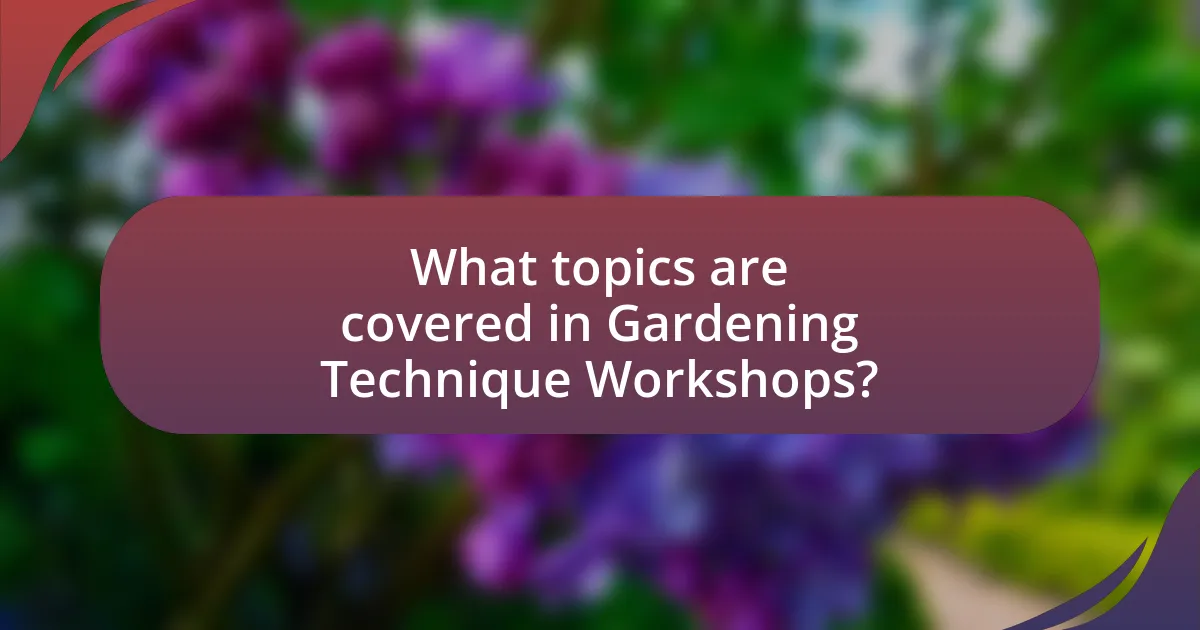
What topics are covered in Gardening Technique Workshops?
Gardening Technique Workshops cover a variety of topics essential for effective gardening practices. These topics typically include soil preparation, planting techniques, pest management, organic gardening methods, and seasonal planting schedules. Workshops often emphasize hands-on learning, allowing participants to practice skills such as pruning, composting, and plant care. Research indicates that community engagement in gardening workshops enhances knowledge retention and fosters a sense of community among participants.
How are different gardening techniques introduced?
Different gardening techniques are introduced through community workshops that provide hands-on learning experiences. These workshops often feature expert instructors who demonstrate various methods, such as organic gardening, permaculture, and container gardening, allowing participants to engage directly with the techniques. Research indicates that interactive learning environments significantly enhance knowledge retention and skill acquisition, making workshops an effective medium for introducing new gardening practices.
What are the most popular gardening techniques taught?
The most popular gardening techniques taught include organic gardening, container gardening, raised bed gardening, and permaculture. Organic gardening emphasizes the use of natural methods and materials to grow plants without synthetic fertilizers or pesticides, promoting soil health and biodiversity. Container gardening allows individuals with limited space to grow plants in pots, making it accessible for urban dwellers. Raised bed gardening involves creating elevated planting areas that improve drainage and soil quality, which is particularly beneficial for those with poor soil conditions. Permaculture focuses on designing sustainable agricultural systems that mimic natural ecosystems, promoting long-term productivity and environmental health. These techniques are widely taught in community workshops to enhance gardening skills and encourage sustainable practices among participants.
How do workshops address local gardening challenges?
Workshops address local gardening challenges by providing hands-on training and tailored solutions that meet the specific needs of the community. These workshops often focus on local soil conditions, climate, and pest management, enabling participants to learn effective techniques that are directly applicable to their gardening situations. For instance, a study by the American Community Gardening Association found that community gardening workshops significantly improved participants’ knowledge of sustainable practices, leading to increased crop yields and reduced pest issues. This evidence demonstrates that workshops effectively equip local gardeners with the skills and knowledge necessary to overcome their unique gardening challenges.
What resources are provided during these workshops?
During the workshops on gardening techniques, participants receive a variety of resources including instructional materials, gardening tools, and access to expert guidance. Instructional materials typically consist of handouts and guides that cover essential gardening practices, plant care, and seasonal planting schedules. Gardening tools provided may include shovels, trowels, and watering cans, enabling hands-on learning. Additionally, expert guidance is offered through experienced horticulturists who facilitate discussions and answer questions, ensuring participants gain practical knowledge and skills. These resources collectively enhance the learning experience and empower community members to successfully engage in gardening activities.
What materials do participants receive?
Participants receive a comprehensive set of materials designed to enhance their learning experience in the gardening workshops. These materials typically include instructional handouts that outline gardening techniques, seed packets for practical application, and tools such as trowels or gloves to facilitate hands-on activities. Additionally, participants may receive access to online resources or guides that provide further information on gardening practices. The inclusion of these materials is aimed at ensuring that participants can effectively apply the techniques learned during the workshops, thereby reinforcing their skills and knowledge in gardening.
How do facilitators support participants after the workshop?
Facilitators support participants after the workshop by providing follow-up resources, ongoing communication, and opportunities for further learning. They often share additional materials such as guides, videos, or articles related to gardening techniques discussed during the workshop. This ensures that participants can continue to apply what they learned. Facilitators may also establish communication channels, such as email lists or social media groups, where participants can ask questions, share experiences, and receive advice. Furthermore, they might organize follow-up sessions or community events to reinforce skills and foster a sense of community among participants. These methods enhance retention of knowledge and encourage practical application of gardening techniques.
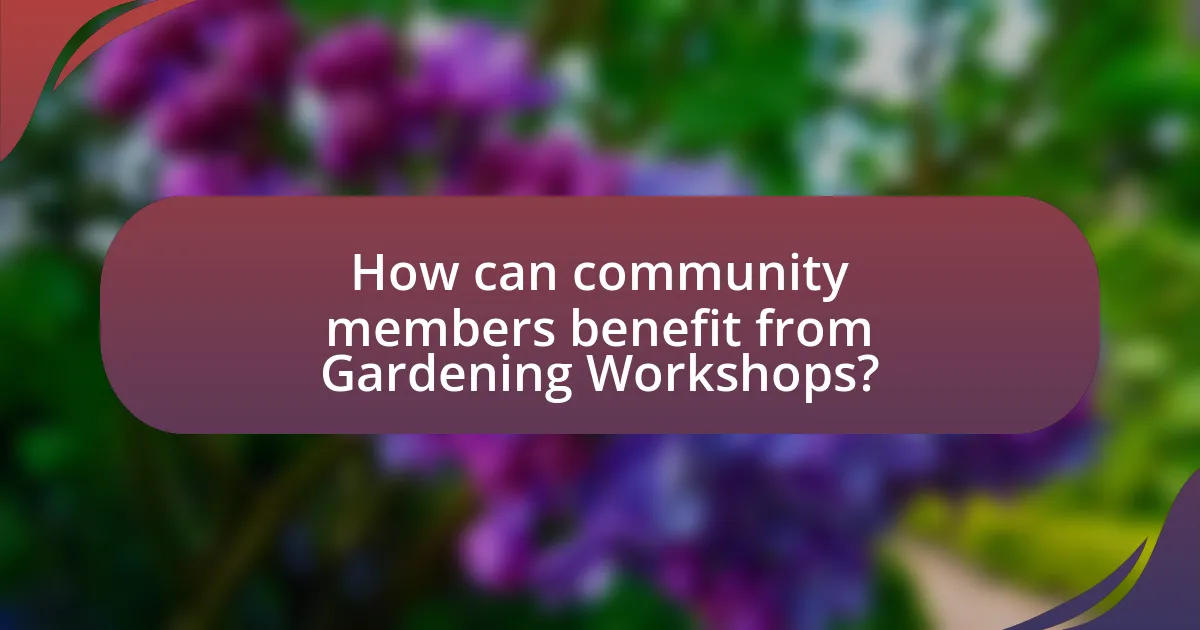
How can community members benefit from Gardening Workshops?
Community members can benefit from gardening workshops by gaining practical skills in horticulture, which enhances their ability to grow food and ornamental plants. These workshops provide hands-on experience, allowing participants to learn about soil health, plant care, and sustainable gardening practices. Research indicates that community gardening can improve food security and promote healthier eating habits, as evidenced by a study published in the Journal of Community Health, which found that participants in community gardening programs increased their fruit and vegetable intake by 50%. Additionally, gardening workshops foster social connections among participants, contributing to community cohesion and mental well-being.
What are the personal benefits of attending these workshops?
Attending workshops on gardening techniques offers personal benefits such as enhanced gardening skills, increased knowledge about plant care, and improved community connections. Participants gain practical experience and expert insights, which can lead to more successful gardening outcomes. Research indicates that engaging in community workshops fosters social interaction, which can enhance mental well-being and reduce feelings of isolation. Additionally, learning about sustainable gardening practices can contribute to environmental awareness and personal satisfaction in contributing to local ecosystems.
How does participation enhance individual gardening skills?
Participation enhances individual gardening skills by providing hands-on experience and access to expert knowledge. Engaging in community gardening workshops allows individuals to practice techniques such as planting, pruning, and pest management under the guidance of experienced gardeners. Research indicates that active participation in such workshops significantly improves skill acquisition; for instance, a study published in the Journal of Agricultural Education and Extension found that participants reported a 40% increase in their gardening knowledge and skills after attending structured workshops. This practical involvement not only fosters confidence but also encourages the sharing of tips and best practices among peers, further enhancing individual capabilities in gardening.
What social benefits arise from community gardening?
Community gardening fosters social cohesion and enhances community engagement. It brings together individuals from diverse backgrounds, promoting interaction and collaboration among participants. Research indicates that community gardens can lead to increased social networks and support systems, as evidenced by a study published in the Journal of Community Psychology, which found that participants reported stronger relationships and a sense of belonging. Additionally, community gardening initiatives often encourage volunteerism and collective responsibility, further strengthening community ties and fostering a sense of ownership over shared spaces.
What impact do these workshops have on the community as a whole?
These workshops significantly enhance community cohesion and environmental awareness. By providing hands-on gardening techniques, participants develop skills that foster sustainable practices, leading to improved local food security. Research indicates that community gardening initiatives can increase access to fresh produce by up to 40%, thereby promoting healthier eating habits. Additionally, these workshops encourage social interaction, reducing isolation and building relationships among community members, which is crucial for a supportive neighborhood environment.
How do workshops contribute to community beautification?
Workshops contribute to community beautification by providing hands-on education and skills in gardening techniques that enhance local green spaces. These workshops empower community members to actively participate in planting, maintaining, and designing gardens, which leads to improved aesthetics and environmental health. Research indicates that community gardens can increase property values by up to 9.5% and foster social cohesion, as participants collaborate and share resources. By equipping individuals with knowledge and tools, workshops facilitate the transformation of neglected areas into vibrant, green spaces that benefit the entire community.
What role do workshops play in promoting food security?
Workshops play a crucial role in promoting food security by equipping participants with essential gardening techniques and knowledge. These educational sessions empower individuals and communities to grow their own food, thereby increasing local food production and reducing dependency on external sources. For instance, studies have shown that community gardening initiatives can lead to a 30% increase in food access for participants, enhancing nutritional intake and fostering self-sufficiency. By providing hands-on training and resources, workshops not only improve agricultural skills but also strengthen community ties, ultimately contributing to a more resilient food system.
What are some best practices for organizing effective gardening workshops?
To organize effective gardening workshops, it is essential to define clear objectives and target audiences. Establishing specific goals, such as teaching sustainable gardening practices or promoting community engagement, helps tailor the content and format of the workshop. Additionally, selecting knowledgeable instructors who have practical experience in gardening ensures that participants receive accurate and valuable information.
Moreover, providing hands-on activities enhances learning, as studies show that experiential learning increases retention rates. For instance, a workshop that includes planting demonstrations or soil testing allows participants to apply concepts in real-time.
Furthermore, promoting the workshop through various channels, such as social media, local community boards, and gardening clubs, increases visibility and attendance. Research indicates that community engagement is significantly boosted when workshops are advertised effectively, leading to higher participation rates.
Lastly, gathering feedback after the workshop helps improve future sessions, as it allows organizers to understand participants’ needs and preferences better. This iterative process of evaluation and adjustment is crucial for the long-term success of gardening workshops.
How can facilitators ensure participant engagement?
Facilitators can ensure participant engagement by incorporating interactive activities that promote hands-on learning and collaboration. For instance, using group discussions, practical demonstrations, and hands-on gardening tasks allows participants to actively contribute and share their experiences. Research indicates that active participation enhances retention and satisfaction; a study by Bonwell and Eison (1991) highlights that students learn better when they are engaged in the learning process. Additionally, facilitators can utilize feedback mechanisms, such as surveys or informal check-ins, to gauge participant interest and adapt the workshop content accordingly, ensuring that it remains relevant and engaging.
What strategies can be used to evaluate workshop success?
To evaluate workshop success, strategies such as participant feedback surveys, pre- and post-workshop assessments, and observation of participant engagement can be employed. Participant feedback surveys collect quantitative and qualitative data on attendees’ satisfaction and learning outcomes, providing direct insights into the effectiveness of the workshop. Pre- and post-workshop assessments measure knowledge gained, allowing facilitators to quantify learning improvements. Additionally, observing participant engagement during the workshop, such as interaction levels and enthusiasm, offers qualitative evidence of success. These strategies collectively provide a comprehensive evaluation framework for assessing the impact of gardening technique workshops on community engagement.
